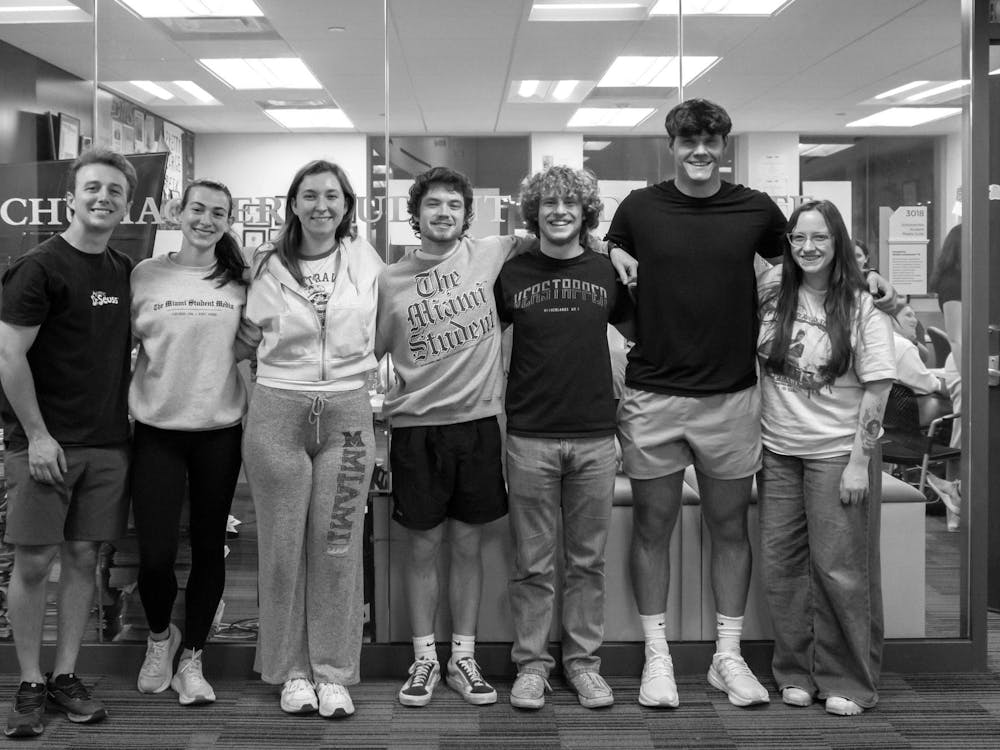Milam's Musings, milambc@miamioh.edu
This may not come as a surprise, but there is a lot I do not know.
I had a chance to attend my first Excellence in Journalism conference in Orlando hosted by the Society of Professional Journalists, the National Association of Hispanic Journalists and the Radio Television Digital News Association.
The conference was a chance to sit in on a great many seminars covering topics like the Ferguson and Baltimore riots, rape on college campuses and the WDBJ Virginia shooting of two reporters. I also had a chance to listen to those doing good work within the profession, from Wesley Lowery at the Washington Post to Brian Stelter of CNN's Reliable Sources and Steve Coll, dean of the Columbia Journalism School.
But among all of that, the one big take away I had, especially in reference to the real-time, on-air developing tragedy of the WDBJ shooting was: it's okay and necessary to say, "I don't know."
Far too often when big events are occurring in real time on cable news or through Twitter, news agencies care more about trying to be first rather than trying to be right.
During the Newtown shooting in 2012, for instance, news media, such as CBS News, posted photos and the name of the suspected shooter: Ryan Lanza. Unfortunately for Ryan Lanza, he wasn't the shooter.
Even Stelter fell prey to this problem. At the conference, he talked about how in his newsroom, shortly after the WDBJ shooting, he "started to hear a name." It was the wrong name and he was chasing the wrong disgruntled employee, he said.
But the name circulated on Twitter and CBS and NBC picked it up and then later retracted it.
Stelter said, during those moments of breaking news, it's best to inform viewers and readers, "We don't know, but we're working on it."
I remember watching the Ferguson protests and then riots live on CNN and CNN would have reporters in the field just standing around, mindlessly rambling. There was nothing to report on at every moment, but they felt they had to be there in that moment.
As Wesley Lowery pointed out in his talk on Ferguson and Baltimore, in some sense, the media's presence, i.e., having 200 members of the media standing around in a suburban environment, facilitated the "something" unfolding.
Enjoy what you're reading?
Signup for our newsletter
As a profession, I think it's obvious that the three most important words to ensuring accuracy and truth are, "I don't know." I can't imagine what it would be like to be misidentified as a shooter on a national stage.
However, acknowledging one's ignorance goes beyond the journalism profession. As I started out saying, there is a lot I don't know.
As it turns out, I'm quite terrible at geography. The hard sciences - biology, chemistry, physics and so on - I know next to nothing (mitochondria is the powerhouse of the cell). I have no idea how to change a tire or the oil in my car. Until this trip to Orlando, I didn't know the process for going through an airport.
I could fill up the rest of this column listing things I don't know and to quote Donald Rumsfeld, there are then those things I don't know I don't know.
But not knowing is a good space to be in because that means there's always room to learn something. Unfortunately, it's a space humans seem hard-wired to be uncomfortable with. Admitting to not knowing seems only second in pain to admitting to being wrong.
Jimmy Kimmel Live has an entire segment on the show called Lie Witness News dedicated to this phenomenon of people unwilling to say, "I don't know." Yes, it's television and there's editing, but it's terribly hard to watch.
On his most recent one from Sep. 24, people on the street were asked, "Are you prepared for a 5.5 magnitude equinox?" An absurd and ridiculous question, of course, but the answers are cringeworthy.
"Stay safe, dig a tunnel and stay away from broken glass and everything flying around," one man said, advising listeners how to stay safe during the equinox.
The Freakonomics podcast with Stephen Dubner and Steven Levitt devoted an entire episode and chapter in their book to what they called "the three hardest words in the English language," i.e.: I don't know.
"What fun is life, if all you do is go through life trying to fake like you're something that you're not?" Levitt said.
In that sense, perhaps true confidence is having the confidence to say, I don't know, but I'm willing to learn, rather than trying to "fake it until you make it." Because what have you really made then?
Amanda Waterman, a professor of developmental psychology at the University of Leeds, backed up the difficulty of these words with studies on children.
In the age range of five-to-eight, two-thirds to three-quarters of children would say yes or no to a yes/no question the researchers knew the children didn't know the answer to.
Apparently, that's something we take into adulthood, wanting to please whoever is asking us something, like a boss or a professor.
I still catch myself wanting to couch my ignorance in an "educated guess" or with prefaces of, "I mean, I'm not really sure, but..." It's just flowery language used to disguise the ignorance. And when you're in a crowd you're sure is as equally ignorant as you, it becomes even easier to show off an air of fake-knowing.
The Socratic paradox seems apropos as an ending point here, "I am the wisest man alive, for I know one thing, and that is that I know nothing."




